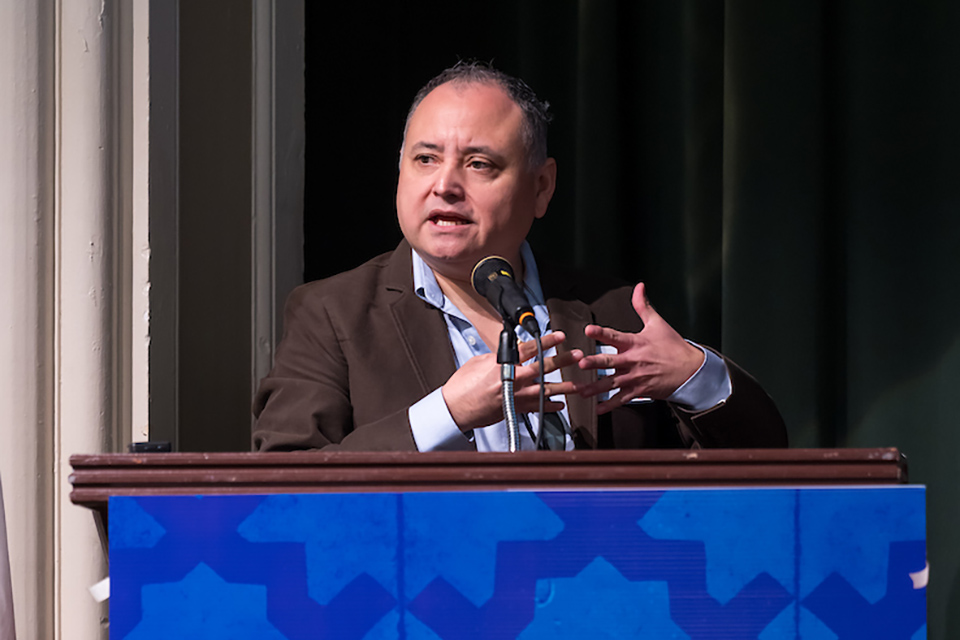- February 18, 2025
How the heart-brain connections impact health and well-being

By Karen Villarreal
How can a stressful life and an overburdened mind lead to a broken heart?
Researchers have established a connection between psychological stress, emotional strain, psychosocial challenges, and acute events like heart attacks, often referred to as a “broken heart.”
Dr. Mario Gil, an associate professor of Neurosciences and Psychology at the UTRGV Department of Psychological Science and School of Medicine Institute of Neuroscience, and his team have identified a region in the midbrain called the Ventral Tegmental Area (VTA), which plays a role in moderating stress activity. Gil’s research focuses on understanding how the connection between the heart and brain affect health and well-being.
HEART-BRAIN CONNECTIONS
“There are proposed pathways for the mechanisms of heart-brain connection in disease. The brain communicates with the heart, and likewise, the heart senses the brain’s stress,” he said. “The interactions between risk factors are the key to heart-brain connections.”
One significant link he identifies is between major depressive disorder and cardiovascular disease.
“One case, on these connections, I find fascinating was first characterized in Japan, it is called Takotsubo Cardiomyopathy,” he explains.
In this study conducted by Japanese cardiologists, it was observed that individuals experiencing profound emotional distress often faced acute events, resulting in “a literal enlargement or deformation of the heart that would send them to the emergency room,” Gil said.
This phenomenon, recognized as stress cardiomyopathy, presents mechanisms that are still not fully understood.
“There is definitely a connection between psychological stress, psychological factors, and these events when it comes to cardiovascular disease,” he said.
A BROKEN HEART
In his findings titled “A Stressful Life, an Overburdened Mind and a Broken Heart: Let’s Talk About How the Heart-Brain Connections Impact our Health and Well-being,” Gil discusses the connection between higher cardiovascular disease (CVD) risk associated with “Type A” lifestyles characterized by high psychological and psychosocial stress. He explains that chronic stress disrupts the central nervous system.
“Hormones like cortisol also impact the heart, and the immune system may cause inflammatory responses,” he said.
Gil has identified several personality traits that may contribute to acute cardiovascular events, including:
- High competitiveness
- Anxiety
- Negative affect
- Depression
- Social factors
- Lack of social and emotional support
He emphasizes the importance of considering the interactions among multiple risk factors when studying cardiovascular diseases, which he believes is essential for understanding heart rate dynamics in the context of cardiovascular health.
Gil suggests that behavioral interventions, such as mindfulness and meditation, can help reduce the nervous system’s burden on the heart and reduce CVD risk.
“There is evidence that anything that provides stress buffering, like social interactions, promotes positive psychological well-being,” Gil said. “That is why social support is so important for mental and brain health.”
Researchers at the UTRGV School of Medicine, including Gil, are conducting studies in clinical settings and the community to gather valuable data. Their goal is to better understand these mechanisms and develop methods and treatments to “help cure a broken heart” by regulating the brain circuits that respond to stressors.
“We should take action. There are people in the community – counselors, social workers, physicians – who can help. By doing so, it’s good for brain, cardiovascular and mental health,” he said.
“Building strong social connections and being a protective factor for other people can help heal broken hearts,” he concludes.

